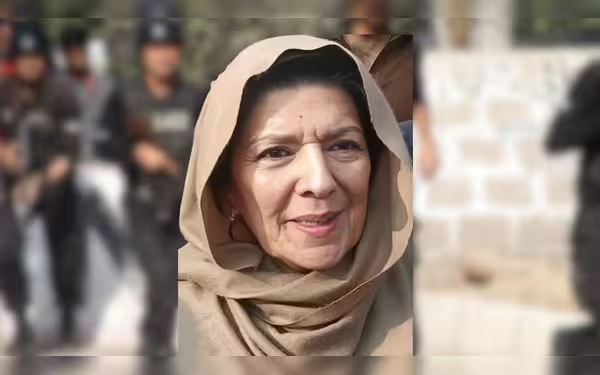Saturday, November 16, 2024 07:39 PM
Aleema Khan Arrested During Islamabad Protest
- Aleema Khan discusses her arrest during a protest.
- Section 144 was imposed, but no curfew was declared.
- The incident raises questions about civil liberties.
 Image Credits: thecurrentpk
Image Credits: thecurrentpkAleema Khan shares her arrest experience during a protest in Islamabad, raising concerns about civil liberties and the right to assemble.
Aleema Khan, the sister of Imran Khan, the founder of Pakistan Tehreek-e-Insaf (PTI), has recently shared her experience regarding her arrest during a protest in Islamabad. This incident has drawn significant attention, especially given the political climate in Pakistan. Protests have become a common way for citizens to express their views, and the government's response to these gatherings often raises questions about civil liberties and the right to protest.
In a video posted by Sardar Qadeer Advocate on X (formerly known as Twitter), Aleema Khan explained the circumstances surrounding her arrest. She stated that she, along with her sister Uzma Khan, was taken into custody by the federal capital police after she had given an interview to a journalist. Aleema emphasized, "We were not committing any violation at that time," highlighting her belief that their actions were within legal boundaries.
During her statement, Aleema clarified the legal context of their arrest. She pointed out that while Section 144 was imposed in the area, which restricts gatherings, it was not a curfew. She argued, "I could have been arrested only if the curfew was imposed," suggesting that the police action was unwarranted under the circumstances. This distinction is crucial, as it raises important questions about the enforcement of laws during protests and the rights of individuals to assemble peacefully.
The incident has sparked discussions about the balance between maintaining public order and respecting individual rights. Many citizens are concerned about the implications of such arrests on freedom of expression and the right to protest. As protests continue to be a vital part of political discourse in Pakistan, the actions of law enforcement will likely remain under scrutiny.
Aleema Khan's experience sheds light on the ongoing tensions between citizens and authorities in Pakistan. It serves as a reminder of the importance of understanding our rights and the legal frameworks that govern public gatherings. As the political landscape evolves, it is essential for citizens to remain informed and engaged, ensuring that their voices are heard in a democratic society.













